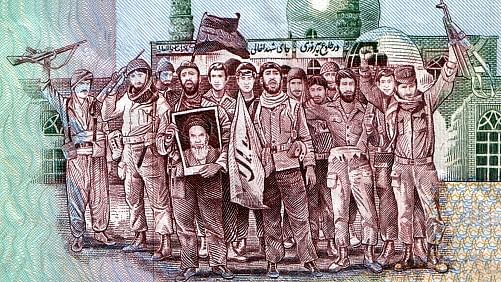
Representative illustration from Islamic Revolution of Iran.
Credit: iStock Photo
As Israeli forces push deeper into the South of Gaza, ushering in unimaginable loss of life and atrocities on civilians in breach of all possible international laws, the UN Secretary General has invoked a rare clause, Article 99 of the UN Charter, to formally warn the Security Council of global threat from the ensuing violence.
Article 99 is a unique authority granted to the secretary-general in the UN Charter. It serves as the sole independent political tool that enables the secretary-general to convene a meeting of the Security Council without external influence.
"There is no effective protection for civilians. Hospitals have turned into battlegrounds..the situation is fast deteriorating into a catastrophe with potentially irreversible implications for Palestinians..Nowhere is safe in Gaza," Antonia Guterres said, while invoking the Article that has remained unused since 1989.
But, what is Article 99?
Article 99 allows the secretary-general to “bring to the attention of the Security Council on any matter which in his opinion may threaten the maintenance of international peace and security”.
Article 99 of the UN charter is widely regarded as the most influential article among a set of articles (97-101) that outline the functions of the Secretary-General (SG). It grants the SG significant political authority by allowing them to engage in "preventive diplomacy". This means that the SG has the power to initiate discussions within the Security Council regarding potential crises that could pose a threat to global peace and security.
Under the new provisions, Secretary-General Guterres will have the privilege to address the Security Council without requiring an invitation from a member state, which is the usual protocol.
When in past has this Article been invoked?
1. Republic of Congo, 1960
On July 13, 1960, Dag Hjalmar Agne Carl Hammarskjöld, a proactive Swedish economist and diplomat who served as the second secretary-general of the United Nations from 1953 to 1961, utilised the concept of "preventive diplomacy" by invoking Article 99. This action was taken in response to a request for UN military assistance made by the Congolese government to protect against Belgian forces and maintain stability in the Republic of Congo.
The invocation of Article 99 resulted in the Security Council adopting Resolution 143, which called for the withdrawal of Belgian troops and the deployment of UN peacekeeping forces to facilitate this process. However, despite these efforts, the conflict in Congo persisted, and the situation worsened in the subsequent years, including the assassination of then Prime Minister Patrice Lumumba.
2. Iran, 1979
On December 4, 1979, the United Nations Security Council responded to the plea made by Kurt Josef Waldheim, the fourth Secretary-General of the United Nations (1972-1981), by adopting Resolution 457. This resolution aimed to resolve the ongoing Iranian-American embassy crisis, which involved 52 American citizens being held hostage by Iranian fighters at the US Embassy in Tehran following the Islamic Revolution in Iran.
The Iranian revolutionary students demanded the return of the deposed Shah Mohammad Reza Pahlavi, who was receiving medical treatment in New York Hospital-Cornell Medical Center, to stand trial in Iran before releasing the embassy personnel. Despite the invocation of Resolution 457, the hostages remained captive for 444 days, which also resulted in loss of two lives. Eventually, the hostages were released after the signing of the Algiers Accords in 1981.
3. Lebanon, 1989
On August 15, 1989, Peruvian diplomat Javier Felipe Ricardo Pérez de Cuéllar, the fifth Secretary-General of the United Nations, specifically referenced Article 99 of the UN charter in relation to the prolonged civil war and conflict in Lebanon. The Security Council urged all parties involved in Lebanon to strive for a ceasefire in 1989, but unfortunately, the conflict persisted despite these efforts.
Can this invocation really stop the war?
The Security Council, consisting of 15 members, is widely recognised as the most influential organ of the United Nations, responsible for upholding global peace and security. If the Security Council decides to follow Guterres's advice and adopt a resolution on a ceasefire, then yes, as it will possess additional authorities to enforce the implementation of the resolution.
These authorities may include the ability to impose sanctions or authorise deployment of an international force. However, it is important to note that the Secretary-General does not possess any powers to compel the Security Council to adopt a resolution. The only way this can happen is when all the five permanent members of Security Council choose not to veto the resolution.
Guterres has been calling for an "immediate humanitarian ceasefire" since October 18, but US has continued to be the biggest shield and a trusted ally to Israel by vetoing resolutions calling for ceasefire in the past. The resolution calling for immediate ceasefire following Guterres's invocation, too, has been vetoed by US, as the vote stood at 13-1, with Britain abstaining.
Alternatively, US had put forward draft that seeks UNSC's authorisation of the Israeli offensive in the name of "Israel's right to self defence", which were vetoed by Russia and China.
As death toll in Gaza mounts to over 16k, 40 per cent of whom were children, and further 7,200 missing, it remains to be seen how far Guterres' efforts can bear fruit in the face of indomitable US that remains persistent in its efforts to back Israel's genocide.